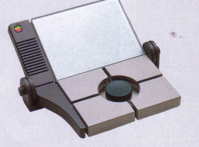Macpaint 3D (lost paint program; 1990s)
Apple Computer needs no introduction. They were a pioneering computer company in the 1970's and 1980's, and are still a big competitor today. They were responsible for bringing computing to the masses with the Apple 2, Lisa, and arguably most famously, the Macintosh. In 1985, Steve Jobs left the company and founded another company called NeXT. This caused Apple to lose direction, leading to poor sales and eventually putting the company under constant threat of bankruptcy. During this 13 year period, Apple created all sorts of weird prototypes that never were produced, most being mobile or home devices. One such device was an ultra thin, professional grade drawing tablet, running a unique drawing program known as Macpaint 3D. The program was a Macpaint application with 3D CAD and resistive touch screen capabilities. However this was not the end of crazy Apple prototypes.
Although today Apple are well known for their phone line, Hartmut Esslinger (the designer of the Apple IIc) originally developed a phone-tablet hybrid which ran a unique version of Mac OS System 1 back in 1983. Whilst the phone had the ability to make notes, find contacts and send cheques, as well as having a touch screen, it never made it past the prototype stage. Although it was never released, it is currently on display at the Frog Design Museum in California.
In 1991, Apple debuted many products in the Japanese magazine Axis, including 2 wrist communicators, a GPS, and a currency exchanger. The first wrist communicator was the Apple Timeband, a virtual watch that may have included a world clock or GPS, and possibly even a cellular function, whereas the second was a flip style communicator with a joystick operated OS, (sadly the OS was not seen in the pictures provided). The GPS unit was designed to be attached to a bicycle and ran a unique OS with limited GPS capabilities, using images of landmarks to denote your route and end destination. The currency exchanger was, as the name implies, a currency exchanger with another unique OS, which would scan money to check exchange rates.
Apart from these prototypes, Apple begun developing various PDA devices to accompany their Newton line, advertising them in the 1994 "Newton-only" magazine, Intelligent Newton Magazine. These Newton devices include a Kids Newton, a "Big City" Newton, a Sports Newton (for coaches), and a sleeker version of the MessagePad 2000. Not much is known about these products, although it's possible they didn't even get past the prototype stages.

